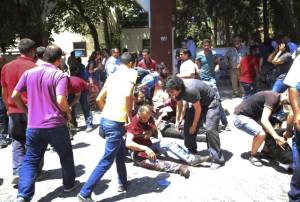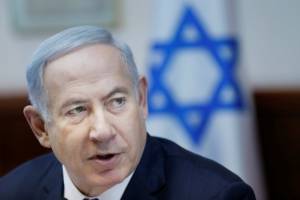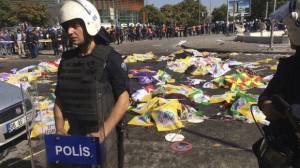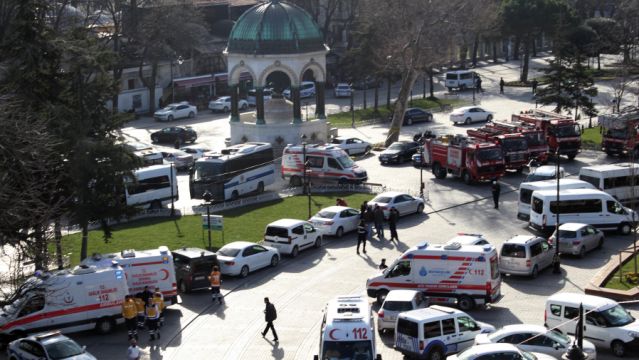A suicide attack on Istanbul’s main pedestrian shopping street Saturday killed at least five people, including the bomber and three Israelis.
Turkey’s interior minister identified the suicide bomber who killed four foreign tourists in Istanbul as a terrorist with links to the Islamic State (IS/ISIS) group.
Minister Efkan Ala said the bomber was Turkish citizen Mehmet Ozturk, who was born in 1992 in Gaziantep province, which borders Syria. He said Ozturk wasn’t on any list of wanted suspects. Five other people were detained as part of the investigation.
Prime Minister Netanyahu and Turkish officials say it is not yet clear whether the suicide bombing in Istanbul – the sixth over the past year – directly targeted Israelis.
“We are in contact with the Turkish authorities. I asked that our presence be increased,” Israeli Prime Minister Benjamin said in a statement. “This evening there will be approximately 15 of our representatives in Istanbul; the Foreign Ministry Director General is on his way there. The Foreign Ministry Director General spoke with his Turkish counterpart and, naturally, we are trying to clarify things in the intelligence sphere. We currently have no confirmation that this terrorist incident was directed at Israelis.
“We know that there are those who have yet to make contact; we are trying to locate them,” he continued. “At the moment it does not seem that they were part of this event but things will certainly become clearer later on. Foreign Ministry personnel, including those here in the situation room, are working constantly and will work around the clock in order to bring the people back to Israel and in order to give full support at this difficult time. I am certain that all Israelis join me in the hope for recovery for the wounded and in expressing condolences to the families of those who were murdered.”
Netanyahu directed the dispatch of two planes – from the IDF and Magen David Adom paramedics – to bring the bodies of the deceased back to Israel.
Istanbul Governor Vasip Sahin said the explosion occurred outside a local government office on Istiklal Street, which is also home to cafes, restaurants and foreign consulates.

People help the wounded after explosion in Suruc, Turkey, in July. (AP/Ozcan Soysal)
Police swiftly sealed off the area as ambulances and a forensic team rushed to the scene after the bombing at about 11 a.m. Normally packed cafes were either closed or virtually empty, with business owners making frantic calls to loved ones to assure them of their safety. Rattled tourists wondered where to go.
“It was one loud explosion,” said Muhammed Fatur, a Syrian who works at a butcher shop near the scene of the explosion. “Police came to the scene and sealed off the area.”
Eli Bin, the head of Israel’s rescue service MDA, told Channel 2 TV that “there is one Israeli killed whose family has been notified,” and said 10 Israelis were wounded in the attack. Since then, it was confirmed that 3 were killed. Israel was investigating to see if its nationals were purposely targeted.
Turkey was already on edge following two recent suicide car bomb attacks in the capital, Ankara, which were claimed by a Kurdish militant group that is an off-shoot of the outlawed Kurdistan Workers’ Party, or PKK. The most recent bombing attack, on March 13, targeted bus stops on Ankara’s busiest street, killing 37 people including two bombers.
Turkish Prime Minister Ahmet Davutoglu convened a security meeting in Istanbul following the attack. His deputy, Numan Kurtulmus said in televised remarks, “it is clear that some people are giving logistic support (to terrorists), that some are giving political support and that they are even providing financial support as well as arms.”
There was no immediate claim of responsibility for Saturday’s attack.

Israeli PM Benjamin Netanayhu said Israel is working together with Turkish authorities. (Amir Cohen/Pool Photo via AP)
A senior government official said authorities were still trying to determine who carried it out, with suspicion focusing on Kurdish militants and the Islamic State group. He spoke on condition of anonymity because he was not authorized to speak to journalists on the issue.
Turkey has had heightened security in Ankara and Istanbul in the run-up to a Kurdish spring festival of Newroz on March 21, which Kurds in Turkey traditionally use to assert their ethnic identity and demand greater rights.
Twos of the Israeli victims held U.S. citizenship.
“The United States stands in solidarity with our NATO ally Turkey in combating the common threat of terrorism,” State Department spokesman John Kirby stated. “We extend our deepest condolences to the families of those killed and our hopes for a quick recovery for those wounded. We will remain in close touch with Turkish authorities during the investigation.
“These acts of terrorism only reinforce our determination to support all those across the region working to promote peace and reconciliation,” he said.
NATO’s Secretary General Jens Stoltenberg condemned the attack in Istanbul, describing it as “yet another terrorist outrage targeting innocent civilians and our ally Turkey.” The U.S. embassy in Turkey expressed shock over the attack on its Twitter account. “We mourn with the families of the lost, and we wish the injured a speedy recovery.”

Bodies of victims are covered with flags and banners in Ankara after an Islamic terror attack in October that killed 102 people. (Burhan Ozbilici/AP)
Iranian Foreign Minister Javar Zarif, who was in Istanbul to meet with his Turkish counterpart Mevlut Cavusoglu, also condemned the “inhumane” attack and offered his condolences.
The Irish foreign and trade minister, Charlie Flanagan, expressed “horror and sadness” at the attack and confirmed that a number of Irish citizens were among the injured.
Video posted on social media apparently capturing the aftermath of the blast showed several motionless bodies lined up at the foot of shuttered shops as a second ambulance arrives at the scene.
On Thursday, Germany had closed its embassy in Ankara, the German school in Ankara and the consulate inIstanbul, which is in the same neighborhood as the blast, following a security warning. Twelve German tourists were killed in a January suicide attack in a historic district of Istanbul.
Saturday’s explosion marks the sixth suicide attack in the country since July. The previous five attacks, which have killed more than 200 people, were either blamed on the Islamic State group by Turkish authorities or claimed by the PKK’s off-shoot.
The PKK has been fighting for autonomy in southeast Turkey for three decades in a conflict that has killed tens of thousands of people. A 2-1/2 year peace process between the government and the PKK broke down in July, reviving the conflict. Since then, the country’s security forces have launched large-scale operations against Kurdish militants in several southeast cities and towns, which have raised human rights concerns amid scores of civilian deaths.
Turkey, which is also a partner in the U.S.-led war against the Islamic State, has also been drawn deeper into the Syrian conflict and forced to absorb 2.7 million Syrian refugees.
By: AP and United with Israel Staff










